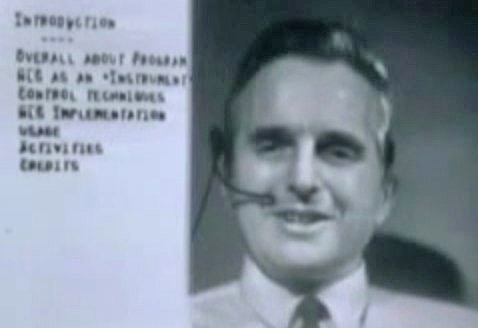re: Kuka Systems TeamPage Case Study
 A customer story about giant orange robots - for real! How good can it get?
A customer story about giant orange robots - for real! How good can it get?
KUKA Titan Largest and strongest 6-axis industrial robot in the world. Payload capacity: 1000 kilograms
Kuka Systems TeamPage Case Study

See Kuka Systems for an excellent TeamPage story Jordan wrote in cooperation with this Traction TeamPage customer. KUKA is one of the world's leading suppliers of robotics as well as plant and systems engineering and has been in the automation technologies business since 1898. They build robotics systems for factory automation and are a leading worldwide supplier of assembly and welding systems, and other related machinery, servicing the automobile, aerospace, and energy industries.
re: Reinventing the Web
For an excellent first hand history of the Web - and a linked data proposal which seems to share many of the simple, scalable properties of his original invention - see Tim Berners-Lee's Feb 2009 TED Talk on the 20th anniversary of the Web:
Providence Geek Talk | Frank and Nuzum speak out: How Pages Crush Documents
 Chris Nuzum and I had a chance to speak to the Providence Geeks about what we've done with Traction TeamPage and how "Pages are Crushing Documents." I do a history of our company and transition into a history of communication and collaboration that runs the course from stone tablets to books through email and documents and finally culminates in wikis and blogs. Now that wikis and blogs are becoming the new currency of collaboration and communication, my presentation focuses on how "packaging matters" with particular focus on the ways pages can be re-used and distributed in ways that can improve communication performance and enable innovation like we've never seen it before. Caught on "film" are my talk followed by a video podcast interview.
Chris Nuzum and I had a chance to speak to the Providence Geeks about what we've done with Traction TeamPage and how "Pages are Crushing Documents." I do a history of our company and transition into a history of communication and collaboration that runs the course from stone tablets to books through email and documents and finally culminates in wikis and blogs. Now that wikis and blogs are becoming the new currency of collaboration and communication, my presentation focuses on how "packaging matters" with particular focus on the ways pages can be re-used and distributed in ways that can improve communication performance and enable innovation like we've never seen it before. Caught on "film" are my talk followed by a video podcast interview.
Water Cooler ROI - Putting Social Software to Productive Work
Matt Hodgson's the ROI of Being Social at Work points to recent MIT research suggesting 40% of productivity for creative teams is a direct result of communication and employees with the most extensive digital networks are 7% more productive.
re: I Love My iPhone
Joel (Chief Geek at Geek.com) loves his iPhone too. He called me after I'd left my Providence Geeks presentation to tell me he'd been walking around like a wet dog in the rain in search of his car. We used our iPhones to find eachother and then used his to find his car. Good fun.
Clarity Amid the Hype
 Mike Gotta posted Enterprise Twitter: Clarity Amid The Hype analyzing - and generally agreeing with - points raised by Adina Levin (Socialtext) in her excellent post What's Different about Enterprise Twitter? I agree with Mike's analysis and Adina's thoughtful points (read them both) but want to focus on Mike's conclusion:
Mike Gotta posted Enterprise Twitter: Clarity Amid The Hype analyzing - and generally agreeing with - points raised by Adina Levin (Socialtext) in her excellent post What's Different about Enterprise Twitter? I agree with Mike's analysis and Adina's thoughtful points (read them both) but want to focus on Mike's conclusion:
Traction TeamPage: The One System to Rule It All

Needless to say I'm delighted with Michael Sampson's Currents: "TeamPage - the One System to Rule It All". I like One System to Rule It All angle, butassume that would make me a metaphorical Elven-smith of Eregion rather than Sauron of course. Hmmm
re: Why Software is a Good Investment
What Jordan meant to say: Send us your money and you'll be happy and save more than you spent!
Why Software is a Good Investment
In tough economic times organizations are faced with hard budgeting choices as they weigh the cost and benefit of investing in durable goods, people, marketing and software. Here are some reasons why software should be at the top of the list:
So, if you are trying to figure out how to put together your 2009 budgets, consider software. And if a track record of technology leadership is any indicator, get Traction.
|
re: Ask an Engineer: What do you think of the Facebook Terms of Service Flap?
For a good example, see Nicolas Kolakowski's Feb 20, 2009 eWeek story Facebook Launches Social Widget for Facebook Connect :
Ask an Engineer: What do you think of the Facebook Terms of Service Flap?

If you haven't been paying attention to this week's flap on Facebook's revised terms of service - posted three days ago and retracted today - Andrew Lavelle of the Wall Street Journal published a good recap today. The controversy relates to what rights does Facebook get to content that an individual Facebook user posts? There are a lot of good arguments about what rights people think Facebook should be able to retain, but there's a second level of discussion that relates to how people expect Facebook privacy settings to work, and how these expectations make it difficult to craft an agreement that seems fair, makes sense, and corresponds to what Facebook actually implements and enforces.
I read Monday's version as a promise to track sharing rules based on Facebook privacy settings as you may change them over time. If so, it looks like developers who use the Facebook API need to reference the current value of per user privacy settings that are authoritatively maintained by the Facebook platform. Not a bad position for Facebook as the gatekeeper for all runtime access - but not easy to craft an agreement that “make sense”, is broad enough to protect Facebook, matches what they actually implement, and can be enforced on their Facebook API developers who also need access to user content.
President 2.0
We've seen our US Government and state level customers seek out and achieve great success as they make their own migrations to "2.0" style collaboration with TeamPage. While "grasss roots" action at the agency level is encouraging, top down involvement and mandates tend to accelerate the proces. With Obama's Transparency and Open Government mandate, perhaps we have it!
re: Searching for the Perfect Fried Clam | Rhode Island
For a longer list of Providence RI restaurants I like, see Providence Rhode Island Restaurants: A Local's Favorites contributed to Bill Ives' list of restaurant picks.
re: Email isn't dead - It's only sleeping ...
In yet another conversation on "is email dead?" I settled on: No - it's just a "strange legacy idea" that's tragicomically inept for collaboration.
What are you good at?
I like what Seth Godin says in What are you good at? Where he talks about the distinction between content (domain expertise) and process (emotional intelligence skills you have for managing projects, visualizing success, dealing with priorities and so on).
At What Scale Can Web Services Survive?
One more data point in line of my Whither Web 2.0 Social Networking Discussion which questions the revenue models of web services (with web social networking as a focal point): An on-line service the scale and scope of Microsoft's Online Services is running into red ink of proportional scale. It lost $471 Million per last quarter. The clear and present issue is not whether a profit may be turned at some even-large scale, but what will change about the business model and how will that affect users?
Reinventing the Web

John Markoff wrote a really good Jan 11 2009 New York Times profile, In Venting, a Computer Visionary Educates on Ted Nelson and his new book, Geeks Bearing Gifts: How the Computer World Got This Way (available on Lulu.com). Markoff notes that Tim Berners-Lee invented the World Wide Web, but: "Lost in the process was Mr. Nelson’s two-way link concept that simultaneously pointed to the content in any two connected documents, protecting, he has argued in vain, the original intellectual lineage of any object... His two-way links might have avoided the Web’s tornado-like destruction of the economic value of the printed word, he has contended, by incorporating a system of micropayments."
I was one of the skeptics who thought that the World Wide Web with its fragile one-way links would never take off as a global hypertext platform. Classic hypertext systems (from HES and Augment though Xanadu, Plato, Intermedia, Lotus Notes, and Dynatext) went to great lengths to preserve the integrity of links, relationships, and content.
Searching Content for People
By moving communication and knowledge exchange to web pages, social software breaks down the walls that traditionally divide e-mail communication and traditional folder based document sharing. As discussed at the conclusion of So, What About Enterprise Social Networking?, this style of interacting online opens avenues for content enrichment and exploitation.
So, What About Enterprise Social Networking?
Last week's post, Wither Web 2.0 Social Networking? and My 2 Cents., offers my perspective on the murky future of web facing personal social networking, as well as a recipe for its survival. The Enterprise Social Networking market, meanwhile, is growing up more steadily in the wake of its Web 2.0 sibling and, despite some commonalities, faces a different value equation, use cases and market forces.
Wither Web 2.0 Social Networking? and My 2 Cents.
Michael Fitzgerald's MIT Tech Review column Are Social Networks Sinking? summarizes the inevitable deflation (though not all-out devastation) of the Web 2.0 Social Networking market (not to be mixed with the Enterprise 2.0 market - which is growing more steadily in-the-wake-of, rather than in-step-with, the Web 2.0 market) bubble.
re: Tuesday Dec 9, 2008 | Forty years after the Mother of All Demos
See also Dylan Tweeny's Wired summary Dec 9, 1968: The Mother of All Demos, including this video clip. Doug hasn't lost his enthusiasm and motivation!
Tuesday Dec 9, 2008 | Forty years after the Mother of All Demos
 On Dec 9, 1968 Doug Engelbart stepped onto a stage in front of about 2,000 people. He adjusted his headset and sat down before his mouse, chord key set, and twenty-two foot TV projection screen. His NLS/Augment system prefigured the Web, shared screen teleconferencing, much of what we know as hypertext, in what's often called the Mother of All Demos. Read this authorized clip from John Markoff's excellent book What the Dormouse Said or see the video of the Demo.
On Dec 9, 1968 Doug Engelbart stepped onto a stage in front of about 2,000 people. He adjusted his headset and sat down before his mouse, chord key set, and twenty-two foot TV projection screen. His NLS/Augment system prefigured the Web, shared screen teleconferencing, much of what we know as hypertext, in what's often called the Mother of All Demos. Read this authorized clip from John Markoff's excellent book What the Dormouse Said or see the video of the Demo.
Doug Engelbart Video Archive: 1968 Demo - FJCC Conference Presentation Reel Dec 9, 1968 Internet Archive, the so called Mother of All Demos. See also From Pranksters to PCs chapter about Engelbart's 1968 FJCC demo from John Markoff's book What the Dormouse Said: How the 60s Counterculture Shaped the Personal Computer Industry, authorized excerpt.
Wikis and Blogs vs. Suites | Forrester vs. CMS Watch | Where is the gloom and doom?
There seem to be conflicting views on what kinds of IT applications and vendors will get hit the hardest in an economic downturn. Will it be point applications like Wikis and Blogs, or Enterprise 2.0 Suites? Or will it be big ticket collaboration platforms from vendors like Microsoft, OpenText and Documentum?
Do Something Differently - Spend less for better results

JP Rangaswami offers typically sound advice for businesses looking at how to cope with hard times in his October 19th post Invented Here. He says when times are hard, a firm has four choices:
 I18N ERROR: @tsiskin#footer_RSS_Feed
I18N ERROR: @tsiskin#footer_RSS_Feed